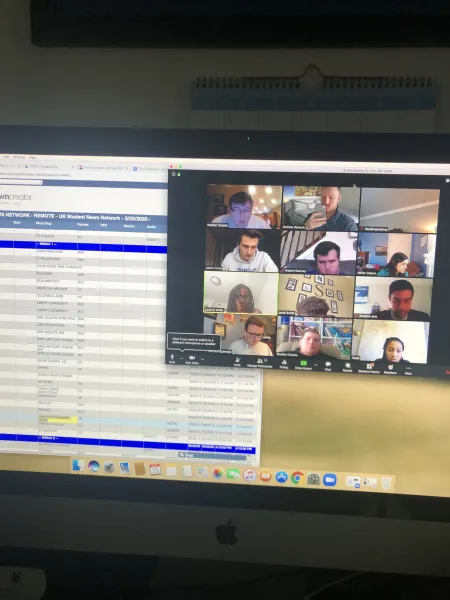April 1, 2020
UK Journalism Students Think Outside the Studio to Keep Broadcasts Going Remotely

Students use smartphones and Zoom recordings for video and other resources to gather, produce and anchor the news from home.
Journalism students in the University of Kentucky School of Journalism and Media have always worked hard to produce, anchor and edit a daily 30-minute live newscast that airs live Monday–Thursday as part of the Student News Network on Spectrum cable channel 184.
With most universities across the country, including UK, moving to fully online instruction in response to the COVID-19 pandemic in mid-March, the challenge became how to do all of these in-studio, in-person tasks remotely to keep the broadcast on air.
Rather than daily meetings to script, plan, edit and produce the newscast, Journalism 404 students, with help from students in the Journalism 302 classes, and led by Andrew Dawson, are now utilizing an online scripting program that allows students to log in and work from home. Students use smartphones and Zoom recordings for video and other resources to gather, produce and anchor the news from home. Students also utilize Google drives to script and edit the newscasts. Chat and comment functions are used to finalize the scripts and shot list. Finally, all of the clips are edited together to make a fully virtual broadcast.
Putting all of the school’s classes online in just over a week, was a challenge, but putting broadcast journalism classes online was particularly challenging, according to Scoobie Ryan, interim director of the School of Journalism and Media in the College of Communication and Information. “It’s a real tribute to Andrew Dawson and our students that they are able to pull this off. They’ve been imaginative and ingenious. They’re still a work in progress, but I am so proud of our instructors, staff and students. This is the kind of grace under pressure, service and can-do attitude that the School of Journalism and Media is all about,” Ryan said.
Dawson echoed the challenge putting classes, which normally meet face-to-face and require group collaboration and input, fully online in a week posed. “While it can be difficult, it is also the best real-world experience our students can get. When our students graduate and interview for jobs, they can tell news directors that they were reporting during the COVID-19 pandemic,” added Dawson.
While this is not an issue limited to the University of Kentucky, Dawson applauds his students’ drive and determination to meet this challenge. “As professional broadcast news organizations are figuring out how to produce newscasts remotely, so are our students. The news doesn't stop, and neither will we.”